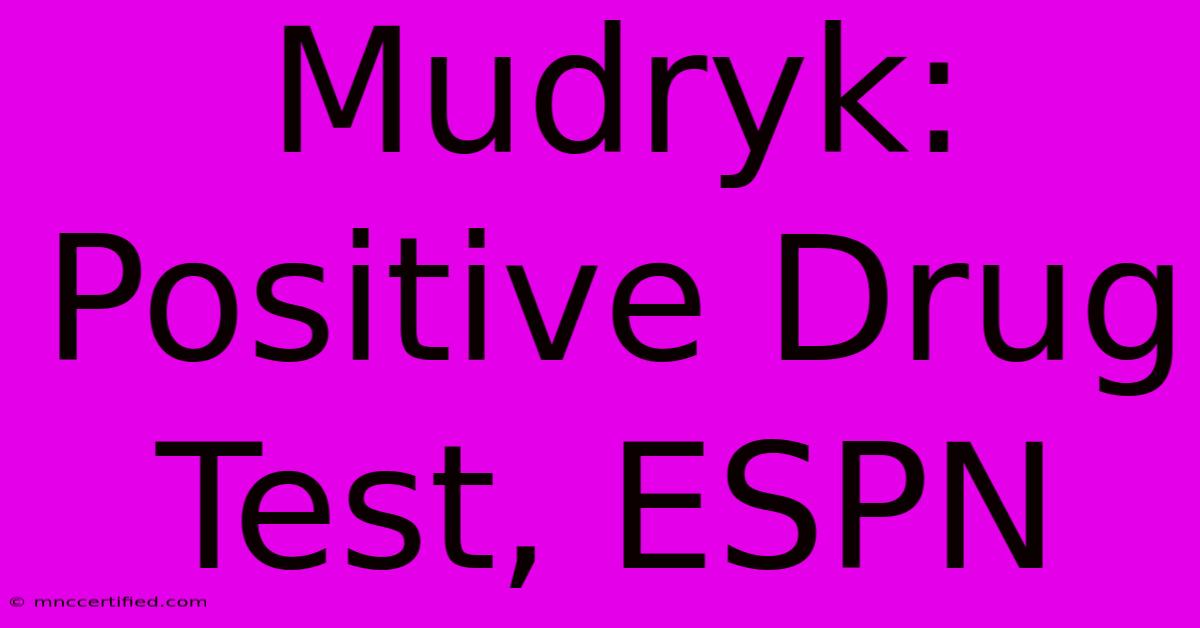Mudryk: Positive Drug Test, ESPN

Table of Contents
Mudryk: Positive Drug Test? Separating Fact from Fiction in ESPN's Reporting
The internet exploded recently with rumors surrounding Mykhailo Mudryk and a potential positive drug test, fueled by a supposed ESPN report. However, a careful examination reveals a need to treat this information with extreme caution. This article delves into the details, separating fact from speculation, and highlights the importance of verifying information before spreading potentially damaging rumors.
The Alleged ESPN Report: What We Know (and Don't Know)
At the time of writing, there's no credible evidence of an official ESPN report stating that Mykhailo Mudryk tested positive for a banned substance. While social media buzzed with claims linking the player to a positive drug test via ESPN, a thorough search of the ESPN website and reputable news outlets has yielded no such report. Many of these claims originated from unofficial sources and lack verifiable proof.
This highlights a crucial point: always verify information from multiple reputable sources before accepting it as fact. Relying on unverified social media posts or unreliable websites can lead to the spread of misinformation and damage reputations.
The Dangers of Unverified Information
The potential consequences of spreading false information about a professional athlete are significant. Such rumors can:
- Damage the player's reputation: False accusations can severely impact a player's career, sponsorship deals, and public image.
- Create unnecessary anxiety for fans: Fans invest emotionally in their favorite players; false reports cause unnecessary distress.
- Undermine the credibility of news sources: The spread of fake news erodes trust in legitimate journalism.
The Importance of Responsible Reporting
Responsible journalism is built on the foundation of fact-checking and verification. Before publishing any information, reputable news organizations meticulously investigate claims, obtain multiple sources, and ensure accuracy. Any reputable report on a potential doping violation would include specifics such as:
- The substance allegedly detected: A clear identification of the banned substance is essential.
- The testing agency involved: The name of the anti-doping organization responsible for the test is critical.
- Mudryk's response (if any): A statement from the player or his representatives would be included.
- The governing body's actions: The response of UEFA or FIFA (depending on the competition) would be vital information.
The absence of these key details in the circulating rumors should immediately raise red flags.
Conclusion: Proceed with Caution
Until a reputable source like ESPN (or another similarly credible sports news outlet) publishes a verified report about Mykhailo Mudryk and a positive drug test, it's crucial to treat the circulating information as unfounded speculation. Always be critical of the information you consume online and prioritize verified information from reliable sources. The spread of false rumors can have serious consequences for athletes and the credibility of the news itself. Let’s promote responsible online behavior and avoid the dissemination of unverified news.
Keywords: Mykhailo Mudryk, Mudryk drug test, ESPN, positive drug test, football, soccer, doping, anti-doping, rumor, misinformation, fake news, verified information, responsible reporting, sports news, athlete reputation, UEFA, FIFA.

Thank you for visiting our website wich cover about Mudryk: Positive Drug Test, ESPN. We hope the information provided has been useful to you. Feel free to contact us if you have any questions or need further assistance. See you next time and dont miss to bookmark.
Featured Posts
-
Major Earthquake Strikes Vanuatu
Dec 18, 2024
-
Rlusd Ripples Stablecoin Expands
Dec 18, 2024
-
After Nba Timmas Ex Wife Speaks
Dec 18, 2024
-
Latvian Basketball Player Found Dead Moscow Investigation
Dec 18, 2024
-
Cagliari Clash Crucial For Juventus Says Torricelli
Dec 18, 2024